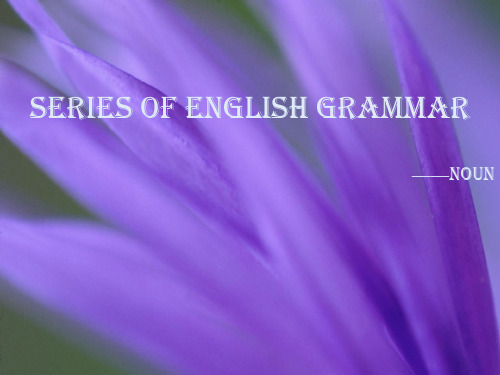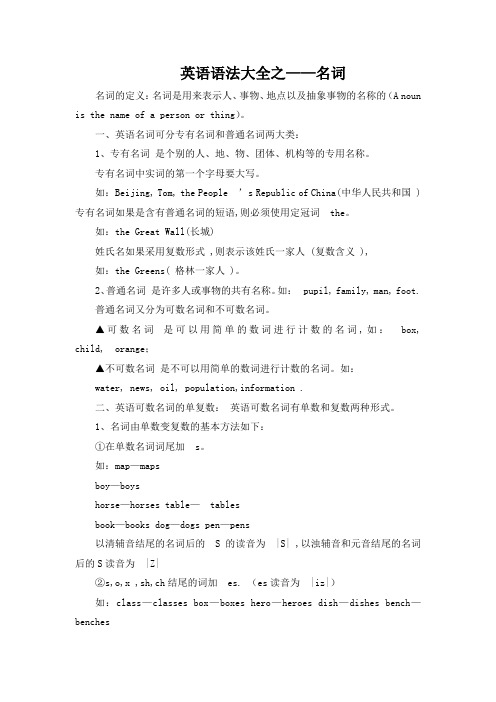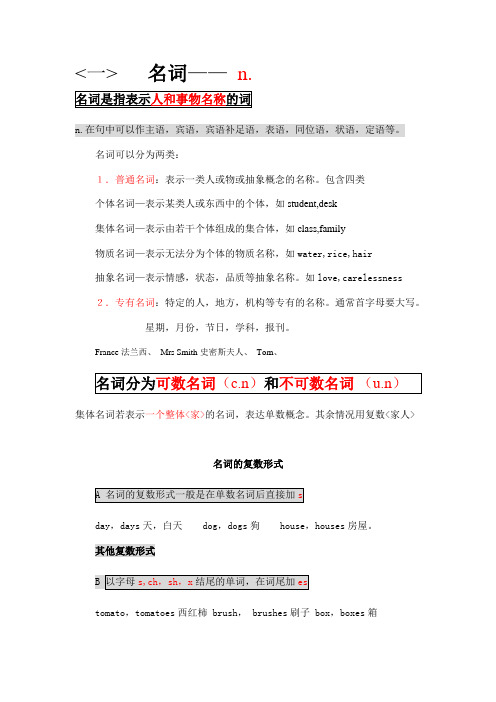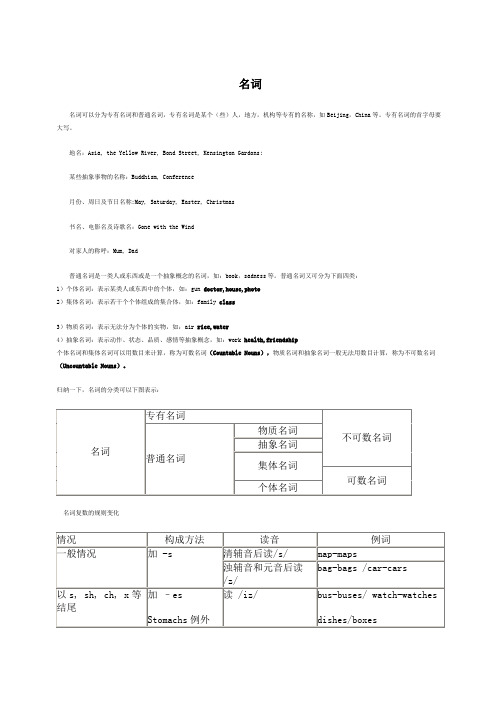英语语法-名词
高中英语语法-名词

表示地名的专有名词
Asia 亚洲 China 中国 Beijing 北京
表示人的专有名词
Yao Ming 姚明 Newton 牛顿 Beckham 贝克汉姆
表示机构的专有名词
the United Nations 联合国
Tsinghua University 清华大学
普通名词 (Common Nouns) 1. Individual Nouns:
Nouns) 不可数名词
(Uncountable Nouns)
一. 规则变化
1. 一般在词尾加-s
清辅音后读/s/,浊辅音后读/z/。
book->books cup->cups bed->beds bag->bags hour->hours house->houses horse ->horses
指作为个体而存在的人或东西
car 汽车 fan 风扇
photo 照片 tree树
book 书
apple 苹果
stick 木棍 stamp 邮票
*
6
普通名词 (Common Nouns)
2. Collective Nou群
family 家庭 team 团队
( 零蛋火山和宣言, 两种形式均存在。)
一. 规则变化
6. 以th结尾的词,在词尾 加“s”: mouth mouths path paths death deaths month months
( 零蛋火山和宣言, 两种形式均存在。)
二.不规则变化
1: 变内部元音 (oo-ee; a-e) man-men tooth-teeth foot-feet goose-geese policeman -policemen saleswoman-saleswomen
英语语法 名词

英语语法名词名词是指表达人、事物、地方和抽象概念的词语,它通常用来作为主语、宾语、表语或补语。
名词可以分为以下几类:1. 可数名词(Countable nouns):表示可以被数的名词,可以用来表示单数或复数形式。
例如:book(书)、dog(狗)、apple(苹果)等。
2. 不可数名词(Uncountable nouns):表示不能被数的名词,只能用单数形式。
例如:water(水)、money(钱)、information(信息)等。
3. 集合名词(Collective nouns):用来表示一组人或事物的名词。
例如:team(团队)、family(家庭)等。
4. 特殊名词(Proper nouns):用来表示特定的人、地点或事物的名词,通常以大写字母开头。
例如:John(约翰)、London(伦敦)、Coca-Cola(可口可乐)等。
5. 抽象名词(Abstract nouns):表示抽象概念、情感或状态的名词。
例如:love(爱)、happiness(幸福)、knowledge (知识)等。
6. 物质名词(Material nouns):表示物质或材料的名词。
例如:wood(木材)、iron(铁)等。
名词在句子中可以有以下几种功能:1. 主语(Subject):名词作为句子的主要动作执行者或主体的角色。
例如:Dogs are loyal.(狗很忠诚。
)2. 宾语(Object):名词作为动作的接受者或作为介词的宾语。
例如:She bought a new dress.(她买了一件新裙子。
)3. 表语(Predicate Noun):名词用来描述或补充主语的属性。
例如:He is a doctor.(他是一名医生。
)4. 定语(Attributive noun):名词作为修饰其他名词的形容词。
例如:a car accident(一场车祸)5. 补语(Complement):名词作为动词或介词后面的补充性信息。
(完整)英语语法--名词

名词名词可以分为专有名词和普通名词,专有名词是某个(些)人,地方,机构等专有的名称,如Beijing,China等.专有名词的首字母要大写。
地名:Asia, the Yellow River, Bond Street, Kensington Gardons;某些抽象事物的名称:Buddhism, Conference月份、周日及节日名称:May, Saturday, Easter, Christmas书名、电影名及诗歌名:Gone with the Wind对家人的称呼:Mum, Dad普通名词是一类人或东西或是一个抽象概念的名词,如:book,sadness等。
普通名词又可分为下面四类:1)个体名词:表示某类人或东西中的个体,如:gun doctor,house,photo2)集体名词:表示若干个个体组成的集合体,如:family class3)物质名词:表示无法分为个体的实物,如:air rice,water4)抽象名词:表示动作、状态、品质、感情等抽象概念,如:work health,friendship个体名词和集体名词可以用数目来计算,称为可数名词(Countable Nouns),物质名词和抽象名词一般无法用数目计算,称为不可数名词(Uncountable Nouns)。
归纳一下,名词的分类可以下图表示:名词复数的规则变化其它名词复数的规则变化1)以y结尾的专有名词,或元音字母+y 结尾的名词变复数时,直接加s变复数.例如:two Marys the Henrysmonkey-——monkeys holiday---holidays2)以o 结尾的名词,变复数时:a。
以元音字母加o结尾或以oo结尾的的加s,如:radio-—-radios zoo---zoos; kangaroo--kangaroosb. 加es,如:hero—heroes Negro—Negroes potato——potatoes tomato—tomatoesc. 上述a和b两种方法均可,如zero———zeros / zeroes vocano—vocanos/vocanoes。
英语语法---名词

8.一些外来词、缩写词和专有名词直接加-s.
元音字母和辅音字母
6
可数名词不规则变化
1. 单、复数同形 如:deer, fish, sheep, crab (螃蟹), people, police, Chinese, Japanese. 2. 改变词干元音字母构成复数 如:man-men, woman-women, foot-feet, goose-geese, tooth-teeth. 3. 词尾发生变化构成复数
14
二、专有名词
15
二、专有名词
专有名词是表示人名、地名、团体、机构、 组织等专有的名称。专有名词一般表示独一无二 的事物,一般看作单数,第一个字母要大写。
• • • • • • • • • • • 1.人名 Jin Xiuxian 金秀贤 Thomas Edison托马斯爱迪生 Professor Du 都教授 2.称呼 Dad 爸爸 Uncle Tom 汤姆叔叔 3.地名和地理名称 Beijing 北京 Asia亚洲 4.星期和月份 Monday 星期一 March 3月 5.节日 Mother’s Day 母亲节 Women’s Day 妇女节
13
二、不可数名词
2.有些名词的单复数形式分别表示不同的意义: wood木头-woods森林 sand沙子-sands沙滩 cloth布-clothes衣服 good益处-goods货物 green绿色-greens蔬菜 people人们-peoples民族 paper纸-papers考卷 3.有些物质名词要根据上下文来决定是可数还是不 可数。 He ate a chicken.他吃了一只鸡。 I don’t like chicken.我不喜欢鸡肉。
英语语法——名词

New york 纽约ቤተ መጻሕፍቲ ባይዱ
建筑物:The Great Wall 长城 Eiffel Tower 埃菲尔铁塔
节日、星期、月份:the Spring Festival春节 Sunday 星期日
January 一月
提示:①专有名词如果是含有普通名词的短语,则必须使用定冠词the. 如:
the Great Wall(长城)
饮料食物:water 抽象事物:love 其他物质:money 科 目:history
milk life ink music
bread air hair English
juice time iron science
例句:I don't like eating meat .我不喜欢吃肉。
是可数名词还是不可数名词?
1、认识可数名词
可数名词就是可以用数字一个一 一个数出来的名词,比如一支笔( one pen)、两支笔 ( two pens)、三张桌子( three desks )、五台电脑( five computers )等。
人:boy 动物: dog 物品: bag 建筑: park
练一练:找出下面句子中的普通名词和专有名词,并注意其用法。
1. I want to eat an apple . 2. There is a computer in the classroom . 3. What colour is your shoes ? 4. He has glasses and his shoes are blue . 5. I can use chopsticks .
books是book的复数形式
②有些普通名词的前面一般要加定冠词the或不定冠词a/an. This is apple.(✗) This is an apple.(✓)
英语语法大全之——名词

英语语法大全之——名词名词的定义:名词是用来表示人、事物、地点以及抽象事物的名称的(A noun is the name of a person or thing)。
一、英语名词可分专有名词和普通名词两大类:1、专有名词是个别的人、地、物、团体、机构等的专用名称。
专有名词中实词的第一个字母要大写。
如:Beijing, Tom, the People ’s Republic of China(中华人民共和国 )专有名词如果是含有普通名词的短语,则必须使用定冠词the。
如:the Great Wall(长城)姓氏名如果采用复数形式 ,则表示该姓氏一家人 (复数含义 ),如:the Greens( 格林一家人 )。
2、普通名词是许多人或事物的共有名称。
如:pupil, family, man, foot.普通名词又分为可数名词和不可数名词。
▲可数名词是可以用简单的数词进行计数的名词,如:box, child, orange;▲不可数名词是不可以用简单的数词进行计数的名词。
如:water, news, oil, population,information .二、英语可数名词的单复数:英语可数名词有单数和复数两种形式。
1、名词由单数变复数的基本方法如下:①在单数名词词尾加s。
如:map—mapsboy—boyshorse—horses table—tablesbook—books dog—dogs pen—pens以清辅音结尾的名词后的S的读音为|S| ,以浊辅音和元音结尾的名词后的S读音为|Z|②s,o,x ,sh,ch结尾的词加es. (es读音为|iz|)如:class—classes box—boxes hero—heroes dish—dishes bench—benchesbus—buses brush—brushes[注]:少数以元音字母o 结尾的名词 ,变复数时直接在词尾 +s。
如:photo—photos piano—pianos radio—radios(但Negro、hero、potato、tomato、mango、mosquito均+es,其他+s) 黑人、英雄、土豆、西红柿、芒果、蚊子③以辅音字母 +y 结尾的名词 ,变y 为i,再加 es。
英语语法名词

<一> 名词——n.n.在句中可以作主语,宾语,宾语补足语,表语,同位语,状语,定语等。
名词可以分为两类:1.普通名词:表示一类人或物或抽象概念的名称。
包含四类个体名词—表示某类人或东西中的个体,如student,desk集体名词—表示由若干个体组成的集合体,如class,family物质名词—表示无法分为个体的物质名称,如water,rice,hair抽象名词—表示情感,状态,品质等抽象名称。
如love,carelessness2.专有名词:特定的人,地方,机构等专有的名称。
通常首字母要大写。
星期,月份,节日,学科,报刊。
France法兰西、Mrs Smith史密斯夫人、Tom、集体名词若表示一个整体<家>的名词,表达单数概念。
其余情况用复数<家人>名词的复数形式day,days天,白天 dog,dogs狗 house,houses房屋。
其他复数形式tomato,tomatoes西红柿 brush, brushes刷子 box,boxes箱baby,babies婴儿 country,countries国家 lady,ladies女士boy,boys男孩,day,days天monkey,monkeys猴子knife—knives刀 life—lives生命Zoo_zoos公园photo_photos hero_heroes英雄potato_potatoes土豆Mouth—mouths嘴, month—months月份,path—paths小路Man > men , woman>women,policeman>-policemen,Policewoman >policewomen , child>children,goose>geese鹅Mouse >mice鼠, foot >feet , tooth>teeth牙齿,Fish>fish sheep> sheep羊, deer>deer鹿people>people1)以-ese或-ss结尾的表示民族或国籍的名词Chinses, Japanese,2)某些以-s结尾的名词,crossroads, means, works等3)某些表示计量单位的名词4)water(水),rice(米饭),milk(牛奶),juice(果汁),bread(面包),tea(茶),orange(橙汁) 等u.n5)集体名词,以单数形式出现,但实为复数在英语中,特别是表示有生命的名词,可以加's表示所属关系,名词的这种形式我们称之为1. 一般在表示有生命的名词后直接加's。
英语语法--名词

名词名词可以分为专有名词和普通名词,专有名词是某个(些)人,地方,机构等专有的名称,如Beijing,China等。
专有名词的首字母要大写。
地名:Asia, the Yellow River, Bond Street, Kensington Gardons;某些抽象事物的名称:Buddhism, Conference月份、周日及节日名称:May, Saturday, Easter, Christmas书名、电影名及诗歌名:Gone with the Wind对家人的称呼:Mum, Dad普通名词是一类人或东西或是一个抽象概念的名词,如:book,sadness等。
普通名词又可分为下面四类:1)个体名词:表示某类人或东西中的个体,如:gun doctor,house,photo2)集体名词:表示若干个个体组成的集合体,如:family class3)物质名词:表示无法分为个体的实物,如:air rice,water4)抽象名词:表示动作、状态、品质、感情等抽象概念,如:work health,friendship个体名词和集体名词可以用数目来计算,称为可数名词(Countable Nouns),物质名词和抽象名词一般无法用数目计算,称为不可数名词(Uncountable Nouns)。
归纳一下,名词的分类可以下图表示:名词复数的规则变化其它名词复数的规则变化1)以y结尾的专有名词,或元音字母+y 结尾的名词变复数时,直接加s变复数。
例如:two Marys the Henrysmonkey---monkeys holiday---holidays2)以o 结尾的名词,变复数时:a. 以元音字母加o结尾或以oo结尾的的加s,如:radio---radios zoo---zoos; kangaroo--kangaroosb. 加es,如:hero—heroes Negro—Negroes potato--potatoes tomato—tomatoesc. 上述a和b两种方法均可,如zero---zeros / zeroes vocano—vocanos/vocanoes。
- 1、下载文档前请自行甄别文档内容的完整性,平台不提供额外的编辑、内容补充、找答案等附加服务。
- 2、"仅部分预览"的文档,不可在线预览部分如存在完整性等问题,可反馈申请退款(可完整预览的文档不适用该条件!)。
- 3、如文档侵犯您的权益,请联系客服反馈,我们会尽快为您处理(人工客服工作时间:9:00-18:30)。
(4) 以o结尾的名词加“s” /z/
* radio – radios * zoo – zoos 只有 potato tomato加“es”构成复数 potato – potatoes tomato – tomatoes (5) 以f、fe 结尾的名词,变f、fe 为v再加 “es” /vz/ * half – halves * shelf – shelves *knife – knives * leaf – leaves
名词所有格
表示名词间的所有关系“ …的”
一.名词所有格的构成方法
1.单数名词后加“’ s”
*Tom ’ s book
*my friend’ s uncle
2.以s结尾的复数名词,则在s后加“ ’” 即可
*Teachers ’ Day *two weeks ’ holiday
3.不以s结尾的复数名词的所有格,仍按 惯例加“’ s”
★可数名词 表示人、事物、地点等的名称。
可数名词有单数和复数两种形式之分
名词的单数形式
一般可用a来修饰 *a
car *a book
在元音发音开头的单词前用
an
* an elephant * an apple 请区别:a useful machine
名词的复数形式
1.复数形式的构成方法 (1) 一般在单数名词后加“s”/s/or/z/
* dog – dogs * book – books
(2) 以s、x、ch、sh结尾的名词加 “es”/iz/ *box – boxes *watch – watches
(3)以辅音字母加y结尾的名词,变y为i加 “es” /iz/ * country – countries * factory – factories 请区别:如果是元音字母加y 结尾的名词 则只须加“s” * boy – boys * monkey – monkeys
money weather cotton homework
wood information news medicine
1.不可数名词无复数,作主语时常看成
单数
*Some bread is over there. *No news is good news. 2.常用how much, much, a little, little, a lot of, some, any等来修饰不可数名词 *They had much money. *He does little housework at home.
饰可数名词复数
*There are a few people in the park.
*How many knives are there in your pencil-box?
★不可数名词
物质名词和抽象名词属于不可数名词如:
water,rice,fish,meat 等。 特别记住: work chalk time space music
( D)1 I found ____ good news in ____ newspaper.
A. a, a C.a, a piece of B.a piece of , a piece of D. a piece of , a
( B)2 What ____ it is today! A. a fine weather B. fine weather C. fine a weather D. the fine weather (A )3 To their _____ , they have all passed the exam. A. surprise C. surprises B. surprising D. surprised
paper(纸) – a newspaper(报纸)
work(工作) – a work(著作) room(空间) – a room(房间)
(2) fruit(水果) – fruits (各种水果)
fish(鱼) – fishes(各种鱼)
hair(所有头发) – hairs (几根头发) time(时间) – times(时代)
Revision of Junior English
Nouns
名词
名 词
表示人、事物、地点 的名称或者抽象概念的词 分为专有名词和普通名词
专有名词
表示个别的人、事物、地点等专 有的名称。专有名词第一个字母要大 写
* Lucy
* China
* the Summer Palace
普通名词
分为可数名词和不可数名词
注意:
可数名词也可用量来表示, of 后用复数
* There are two bags of clothes over there. * We have five boxes of apples.
4.有些可数名词或不可数名词在一定情 况下可相互转化,同一个词,但意思不同 (1) glass(玻璃)– a glass(玻璃杯)
巧分可数名词和不可数名词
物体分几半,名字不改变,不可数名词 记 心间;(paper ,milk ,water ,meat) 物体分几半,名字就改变,可数名词记心 间。 (car ,radio ,bed ,man)
名词的一般用法 ★名词做定语
1.修饰另一名词时,一般用单数
* He has two pencil-boxes. * here are three banana trees over there. 2.man woman用做定语时,应与后面的
* Lucy and Lily’s room
露西和莉莉的房间(两人共有一间房间)
请区别: Lucy’s and Lily’s rooms
露西的房间和莉莉的房间 (两人各有一间房间)
★ in hospital in the hospital
他生病住院。
(生病)住院 在医院里
*He’s ill in hospital.
( D)4 Lucy is ____ sister.
A. Mary and Jack B. Mary’s and Jack’s
C. Mary and Jacks
D. Mary and Jack’s
( D)5 Please make ____ for him. He is very tired. A. any room C. some rooms B. any room D. some room
(businessman).
6 Last week we went to the Children’s (child) Park. __________
改错
1. It’s a hard work. It’s hard work. 2.We don’t have any class on Sundays. We don’t have any classes on Sundays. 3. The room’s windows are very big. The windows of the room are very big.
2.特殊变化的单词 (1)单复数同形
Chinese – Chinese
fish – fish
Japanese – Japanese
(2)变元音字母oo为ee
sheep – sheep
tooth – teeth
foot – feet
3.变man为 men man – men woman – women policeman – policemen Frenchman – Frenchmen 请区别:German(德国人) – Germans 4. 其它形式 child – children mouse – mice
families 3 How many ________ (family) are there in this town? deer 4 There are ten ________ (deer) on the farm. 5 These ________ (German) are businessmen Germans __________
★名词做主语时,应注意名词的数,避免主
谓不一致。
* Her family is a large one and her family are all teachers.
她家是一个大家庭,她的家人都是老师。
*There is a pair of glasses on the desk.
桌上有一副眼镜
3.常用a piece of, a cup of, a glass of,a bottle of等来表示不可数名词的量,单复数 表现在of 前面的名词上,而 of 后始终是单 数
*There is a piece of paper in the
book. *Three glasses of orange are on the desk.
6.常以复数形式出现的名词
people trousers
clothes
police
glasses
这些名词作主语时,注意它们的谓语用 复数 * My clothes are newer than yours.
* The police often come here.
7.可用how many,many,a few, few,any,lots of, some,a lot of 等修
.
4 How many milk is there in the bag?
How much milk is there in the bag?
5.Could I have three papers ,please? Could I have three pieces of paper ,please? 6.These two pieces of bread is over there. These two pieces of bread are over there.
